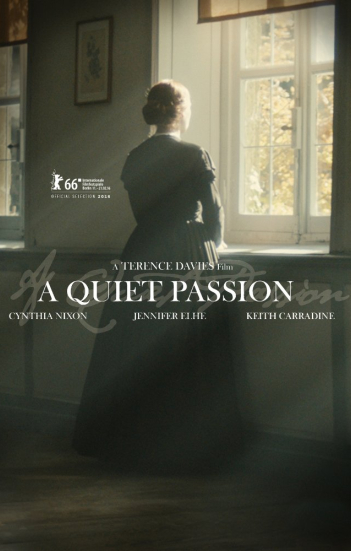Film Review | Emily Dickinson’s Lust for Life Apparent in A Quiet Passion
The best of the 19th century American poets, Emily Dickinson’s greatest artistic strength and most intolerable social weakness were one in the same; non-conformity. This is the central struggle at the heart of Terence Davies’ A Quiet Passion, a delicately exquisite, thoughtful and despairingly sad portrait of the life of this literary icon.

Dickinson’s rebellious prose and aversion to the rigid poetic form of the day meant her genius wasn’t discovered until well after her death in the much more experimental modernist period of the 1920’s. She also was a notorious recluse. Due to society’s muzzling of any display of female independence, her own self-loathing anxieties as well as distrust of the public sphere, Dickinson found it difficult to forge many meaningful relationships outside of her immediate family.
As the film shows, she would write her poems in the relative solitude of the dead of night, spend much of her later life locked away in her room and of course, never marry. A Quiet Passion is a mediation of the how a devotion to one’s art, passion and core values can come at the cost of happiness and real fulfilment.
While the film follows its heroine from her insubordinate time at a Female Seminary right up to her death at 56, much of the action takes place within the confines of the Dickinson household. Like his subject, writer/director Davies’ style is uncompromising. As if to capture the uptight inflexibility of the times, his camera often remains static. When it does move its excruciatingly gradual and deliberate. There’s a braveau 360 degree pan in the living room that, without a word spent, reveals to us both the roles of each family member and offers a fly on the wall window into the muted routine of 19th century life.
Cynthia Nixon is perfectly, passively resistant as Emily, an intelligent woman whose intellectually straightjacketed by the age she presides in. She’s sharp, stoic and reticent but there’s a deep, desolate yearning behind her eyes in those earlier scenes. As she interacts with her sister Vinnie (Jennifer Ehle), Brother Austin (Duncan Duff ) and Father (Keith Carradine) through impossibly clever quipping and understated outbursts, we understand how Emily’s family life was a sort of comforting prison she made for herself.
This Emily does venture into the outside world but, just as with her poetry, the death and egress of others made too strong an imprint on her. Everyone either dies, like her parents, or leaves, like a pastor whom she falls for but who, of course, does not reciprocate those feelings. Davies is nonetheless very capable of shooting the interiors with flair. Emily’s imagination was her solace and in a dreamy sequence where she is visited at night by “The Master”, Davies’ shadowy lighting suggests a house haunted by the ghost of Emily’s unfulfilled, sexual desires.
A Quiet Passion allows its audience to empathise with a character who was perhaps misunderstood as an unfeeling isolate. Emily simply wasn’t allowed to feel, and like these bridled emotions, her poetry was stashed away, only to be seen by those close to her. Not that she wasn’t hurt by her own anonymity. Davies never tries to pretend his subject would even feel vindicated by her legacy. “A posthumous reputation is only for those whom in life were not worth knowing” she tells the pastor, the only person who sees her talent for what it is. Then again, we were always better judges of her work than she ever was.
For Davies, her passion may have been quiet, but it was never absent.
A Quiet Passion is in cinemas from April 7th.
Featured Image Source

